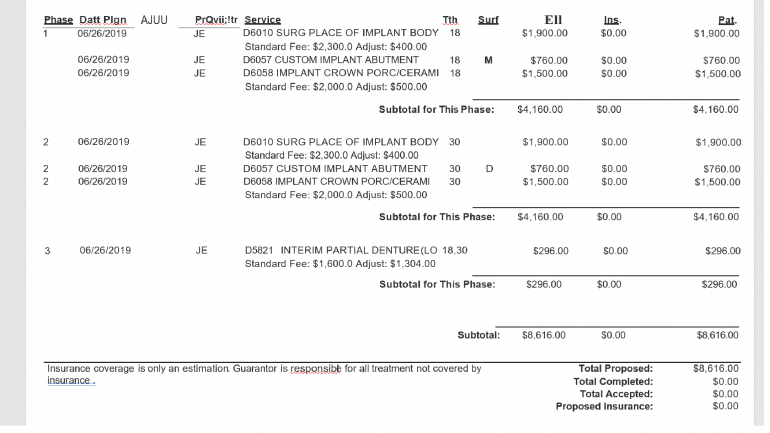
Dental Code D9930: Treatment of Complications - Circumstances
In the field of dentistry, specific codes are utilized to classify and describe various dental procedures. One such code is Dental Code D9930, which pertains to the treatment of complications that may arise after a dental surgery, particularly in unusual circumstances.
Dental Code D9930 Price Range & Savings
On average, patients pay $55 for this D9930 service at the dentist's office, with as little as $40 charged for this in less expensive cities and as much as $80 in more expensive cities.
Low cost of living | Medium cost of living | High cost of living |
Memphis (Tennessee), Cincinnati (Ohio) | Miami (Florida), Denver (Colorado), Austin (Texas) | (New York (New York), San Francisco (California) |
$65 | $120 | $210 |
However, the price for the service D9930 depends not only on the region where you live, but also varies from dentist to dentist. Therefore, it makes sense to compare prices before choosing a dentist. The best way to do this price comparison is at Dr. BestPrice and save a lot of money.
What Does Dental Code D9930 Mean?
Dental Code D9930 is utilized when treating complications that occur following a dental surgical procedure, specifically in situations that deviate from the norm. It is important to note that this code is reserved for cases where the complications encountered require additional attention and specialized care beyond what is typically expected.
Identification and Assessment of Complications
The initial step in addressing complications under Dental Code D9930 involves the identification and assessment of issues that have arisen after a dental surgery. These complications can manifest in various ways, such as excessive bleeding, severe pain, infection, swelling, or any other unexpected problems. The dentist conducts a thorough evaluation of the patient's symptoms, medical history, and relevant diagnostic tests to determine the nature and severity of the complications.
During the evaluation, the dentist carefully examines the surgical site to look for signs of inflammation, infection, or abnormal healing. They may also inquire about the patient's pain levels and any difficulties they are experiencing, such as difficulty eating or speaking. Additionally, the dentist reviews the patient's medical history to identify any pre-existing conditions or medications that may influence the treatment approach.
By considering all these factors, the dentist gains a comprehensive understanding of the complications and their potential causes. This step is essential as it lays the foundation for developing an effective treatment plan tailored to the patient's specific needs. With a thorough assessment, the dentist can ensure that the subsequent steps address the underlying issues and promote successful resolution of the complications.
Development of a Personalized Treatment Plan
Once the complications have been identified and assessed, the dentist proceeds to develop a personalized treatment plan tailored to the specific needs of the patient. This plan takes into account the underlying cause of the complications and aims to address them effectively. The dentist considers factors such as the patient's overall health, the extent of the complications, and any potential risk factors.
To create a comprehensive treatment plan, the dentist may consult with other dental specialists or healthcare professionals to gather additional expertise and insights. They may also utilize advanced imaging techniques, such as X-rays or 3D scans, to obtain a detailed view of the affected area. This helps the dentist accurately visualize the complications and determine the most suitable treatment approach.
Specialized Interventions
In this step, the dentist implements specialized interventions to treat the complications identified. These interventions may include surgical procedures that target specific issues, such as draining an abscess, removing infected tissues, or repairing damaged structures. The dentist ensures that these interventions are carried out with precision and meticulous care to minimize risks and maximize the chances of successful resolution.
During surgical interventions, the dentist follows strict sterilization protocols to prevent the spread of infection and maintains a sterile environment throughout the procedure. They utilize specialized instruments and techniques to access and treat the affected area accurately. The dentist may employ advanced technologies, such as dental lasers or microsurgical tools, to enhance precision and minimize tissue trauma.
Monitoring and Follow-Up Care
Following the specialized interventions, close monitoring and follow-up care are crucial to ensure the patient's recovery progresses as expected. The dentist closely monitors the patient's progress, taking note of any changes or developments. They may prescribe medications to manage pain, prevent infection, or promote healing. Regular check-ups are scheduled to assess the patient's recovery and make any necessary adjustments to the treatment plan.
During the monitoring phase, the dentist evaluates the patient's healing progress, ensuring that any signs of complications or post-operative infections are promptly addressed. They provide guidance on proper oral hygiene practices, including gentle brushing techniques and the use of antimicrobial mouth rinses. The dentist also advises the patient on potential discomfort or side effects they may experience during the recovery period.
Through regular follow-up appointments, the dentist assesses the patient's response to treatment, making any necessary modifications or interventions to optimize the healing process. They address any concerns or questions the patient may have, providing ongoing support and guidance throughout the recovery journey. By closely monitoring the patient's progress and providing comprehensive follow-up care, the dentist ensures the best possible outcome and long-term oral health for the patient.
Summary of Dental Code D9930
Dental Code D9930 plays a vital role in addressing complications that arise in post-surgical dental procedures, particularly in unusual circumstances. By adhering to this code, dentists are equipped to provide the necessary care and attention to patients experiencing unexpected complications. The process involves the identification and assessment of complications, the development of a personalized treatment plan, specialized interventions, and diligent monitoring to achieve optimal oral health outcomes for patients.
Join the dental revolution with Dr.BestPrice! Premium care, pocket-friendly prices.
